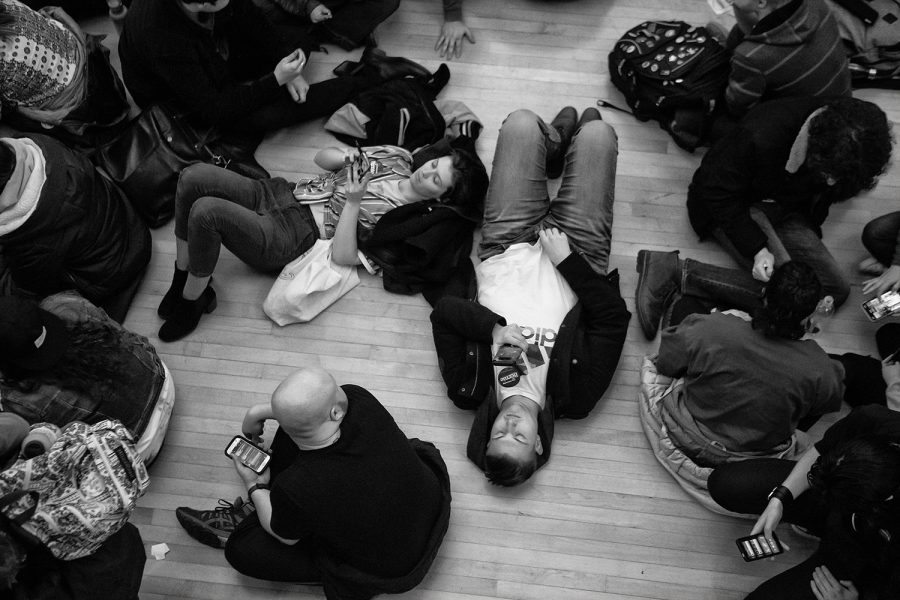Opinion: 20 Out of 20: The cauc-tastrophe shows why Iowa doesn’t deserve to be first
Between the specific collapse on Monday night and the fact that it already was already a bad system, the Iowa caucuses as we know them are over.
University of Iowa students wait as they caucus at the Iowa Memorial Union on Monday Feb. 3, 2020.
February 5, 2020
Well, that didn’t go well.
The total failure on Monday night may have marked the last-in-history, first-in-the-nation Iowa caucuses.
There are two separate reasons for why that’s the case. While neither disaster would end the presidential-nomination tradition individually, the impact of them together is probably enough to move the Hawkeye State off the top of the presidential-nomination schedule.
The disaster of the night
I wrote a column on Monday about the two key takeaways from caucuses: the left was strong, and former Vice President Joe Biden was exceedingly weak. That verdict held up after partial results were announced Tuesday, but that’s not the point.
Because there weren’t any authorized results from the Iowa Democratic Party on caucus night, when I was writing my colum, I had to rely on unofficial reports from the New York Times, which had reporters across the Hawkeye State independently tracking precincts.
According the Iowa Democratic Party, this is all because of its new app used by precinct chairs to report totals. But after that didn’t work, its phone-based back-up system was also botched.
Even a cautious trickle of results would have been fine. Late election nights are nothing new in America. Slow is understandable, silence is not.
Frustration aside, there’s major consequences for the Democratic nomination because it was so screwed up.
Whoever actually won Iowa — and it appears it was either independent Sen. Bernie Sanders of Vermont or former South Bend, Indiana Mayor Pete Buttigieg — doesn’t get their moment of glory.
Iowa isn’t special because we have a lot of delegates to send to the party convention. (We’re only 1 percent of the U.S. population.) Iowa is special because we’re symbolic. And with the national media already onto the State of the Union address and impeachment proceedings, our moment is over.
It changed campaign strategy, too. Buttigieg declared victory because he had to; his entire campaign hinged on doing well in Iowa to gain momentum. He had little to go on, but he had to gamble and hope he was right.
As for the other end of the results chart, Biden gets a relatively soft landing after his skydive. His underperformance got convoluted in all the confusion, unfairly sparing him from what should have been a week of getting dragged.
In short, the Iowa results didn’t matter like they should because of the party’s ineptitude.
The disaster of the system
Even without Monday’s meltdown, the caucus system still has a litany of problems on the merits.
The best argument in support of our state’s first-in-the-nation caucuses is gone now. Even with all of the quirks, shortcomings, and accoutrement, we had one good reason to support our way of doing things: Iowa is competent.
Iowa caucusgoers are diligent and deliberative. We’re smart and earnest. We travel an hour to hear a speech from a candidate who isn’t even in our favorite “just to hear them out.” We’ve been doing this for nearly 50 years. It’s our thing. We got this.
And now we don’t got this.
Of course, Iowans themselves aren’t to blame for the cauc-pocalypse. But it doesn’t matter whose fault it is now because we just lost our thing.
There was already plenty of recent pressure statewide and nationally to reform the caucuses, and the indictments are damning.
Around 90 percent of Iowans are white compared to 60 percent of Americans. Especially for the racially diverse Democrats, Iowa isn’t very representative.
Caucuses are an hours-long event on a weekday, which excludes those who can’t afford to get a babysitter or take off work. Also, many precinct locations are inaccessible for those with physical disabilities.
The most incriminating flaw of caucusing is its public nature. You and all your friends can see how each other is making your presidential-nomination decision, which would be a major red flag to an international observer if we weren’t in a Western imperialist country.
And the counterargument against private voting — that caucuses are about persuasion, and that scrappy atmosphere is just part of the Iowan way of doing things — is largely gone now too. My fellow Daily Iowan opinions staffer Kalen McCain wrote a column about how the new viability rules imposed by the Iowa Democratic Party undermine this aspect of the process.
The disaster of the future
After all the chaos, where are we? Not heaven, that’s for sure.
The caucuses probably could have survived one of these two problems.
It could have been the case that after the November election, the party sat down and decided to make the Democratic caucuses more primary-like as the Iowa Republicans already have. There have been plenty said about the need for reform in publications from the Times and Vox to local outlets such as The Gazette and the DI. If things had gone smoothly Monday, it would have been tenable to tweak the system while keeping Iowa first.
It also could have been the case that we had improved the caucuses before the app blew up. One could imagine the primary calendar going off without a hitch until, for example, Indiana in May. Sure, the snafu would be newsworthy and some Hoosier Democrat would get fired, but it wouldn’t alter the way party and the rest of America would view the race overall.
Iowa was too important to mess up this badly, but we did. And whatever the future of the presidential primaries looks like in four year, Iowa probably won’t be first in the nation.



